We may not have the course you’re looking for. If you enquire or give us a call on + 1-866 272 8822 and speak to our training experts, we may still be able to help with your training requirements.
Training Outcomes Within Your Budget!
We ensure quality, budget-alignment, and timely delivery by our expert instructors.
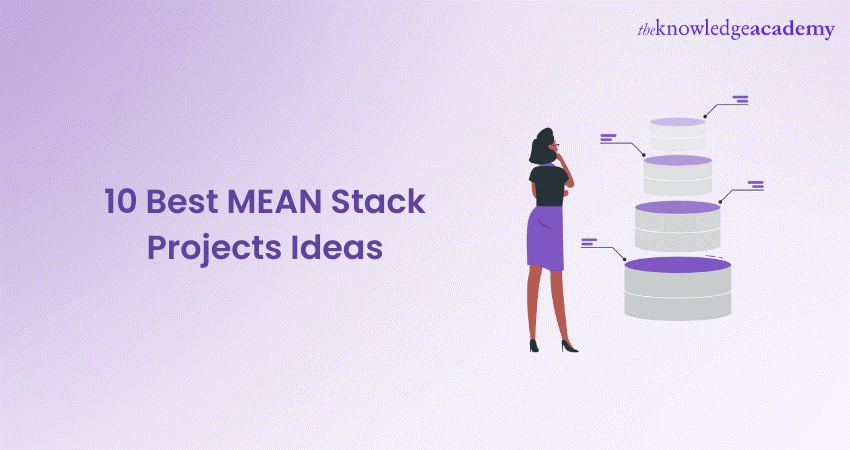
Welcome to the exciting world of MEAN Stack Projects, where innovation meets efficiency in web development. The MEAN Stack, encompassing MongoDB, Express.js, Angular, and Node.js, is a powerful combination of technologies that enable developers to create versatile, high-performance web applications.
Engaging in MEAN Stack projects plays a crucial role in a learner's development, providing not just theoretical knowledge but also practical, hands-on experience. These projects challenge learners to apply concepts in real-world scenarios, bridging the gap between learning and doing. Explore the future of web development with this blog on Mean Stack Projects, exploring unique ideas and inspiring solutions to stay ahead in full-stack development.
Table of Contents
1) MEAN Stack Projects ideas for Beginners
a) Application for managing tasks
b) E-commerce website
c) Dashboard for social media interaction
d) Platform for online education
e) Tracker for personal financial management
f) Chat application/website
g) Personal portfolio website
h) Food delivery platform
I) Online therapy platform
j) Logo maker platform
2) Conclusion
MEAN Stack Projects ideas for Beginners
MEAN Stack projects are invaluable stepping stones for beginners embarking on their journey in Web Development. The MEAN Stack, an integrated suite of JavaScript technologies (MongoDB, Express.js, AngularJS, and Node.js), offers a robust framework for building dynamic, full-stack web applications.
Now, for beginners, working on MEAN Stack projects is not just about learning individual technologies in isolation but about understanding how they interconnect to create efficient, scalable applications. These projects provide hands-on experience in dealing with databases, server-side processing, front-end interfaces, and the intricacies of web application development.
By tackling real-world problems, beginners can grasp the practical aspects of coding, problem-solving, and application design. Moreover, MEAN Stack's JavaScript-centric approach ensures a smoother learning curve, as it requires proficiency in just one primary language.
Engaging in such projects accelerates learning, builds confidence, and lays a solid foundation for future professional development in the field of web technology. Below are some important and popular projects for your reference and guidance:
1) Application for managing tasks
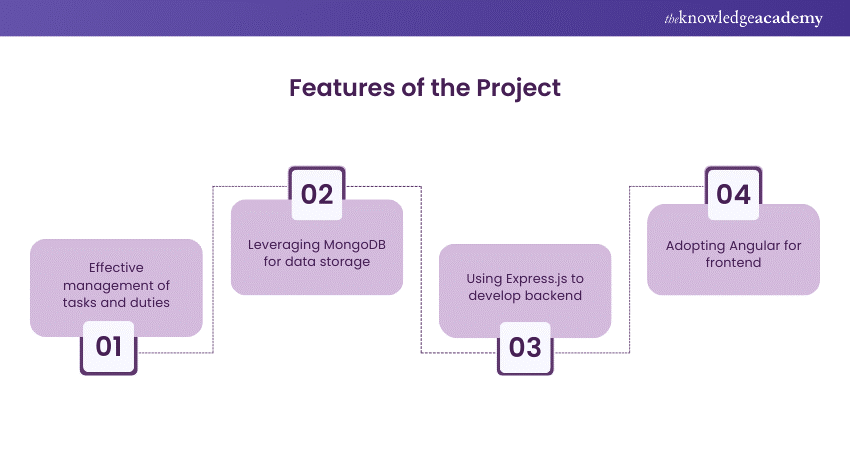
Imagine developing an online task management tool that allows users to manage their tasks and duties effectively. This project leverages MongoDB for storing data, utilises Express.js to develop the backend API, employs Angular for the frontend interface, and Node.js to operate the server.
The key benefits include:
a) Intuitive interface for task creation, editing, and removal.
b) Instant updates and alerts to improve team collaboration.
c) Tailorable task categories and levels of importance.
d) Implementation of deadlines and reminder systems.
The skills exhibited include:
a) Executing CRUD (Create, Read, Update, Delete) processes with MEAN Stack elements.
b) Seamless interaction between the frontend and backend.
c) Implementation of user access control and security measures.
Learn all the concepts of Node.js and MongoDB by signing up for our MEAN Stack Web Development Training now!
2) E-commerce website
Create an online shopping website designed for smooth and user-friendly shopping experiences. Employ MongoDB to organise product details, customer profiles, and transaction records. Use Express.js to build APIs for product discovery, customer verification, and handling purchases. Angular is utilised to design a dynamic and engaging user interface.
The fey benefits include:
a) Extensive product catalogue with refined search and filter capabilities.
b) Secure user login and reliable payment transactions.
c) Efficient management of shopping carts and tracking of orders.
d) User-generated product assessments and ratings.
The skills showcased include:
a) Integration of external payment systems.
b) Management of user sessions and security tokens.
c) Managing intricate data associations within MongoDB.
Create user-friendly applications by signing up for our Mobile App Development Course!
3) Dashboard for social media interaction
Construct an all-encompassing social media command centre that consolidates the management of various social media profiles into a singular interface. MongoDB is the backbone for storing details about user accounts, their posts, and interaction metrics.
Express.js is utilised for managing user login processes, submitting posts, and fetching data. Angular is employed to create engaging and interactive data displays.
The key benefits include:
a) Unified stream showcasing content from diverse social media channels.
b) Instant updates on reactions, comments, and shares.
c) Tailor-made user profiles with adjustable privacy options.
d) Comprehensive analysis and insights on social media interactions.
The skills exhibited include:
a) Seamless data syncing in real-time among numerous users.
b) Crafting dynamic data representations using Angular.
c) Robust mechanisms for user sign-in and access control.
4) Platform for online education
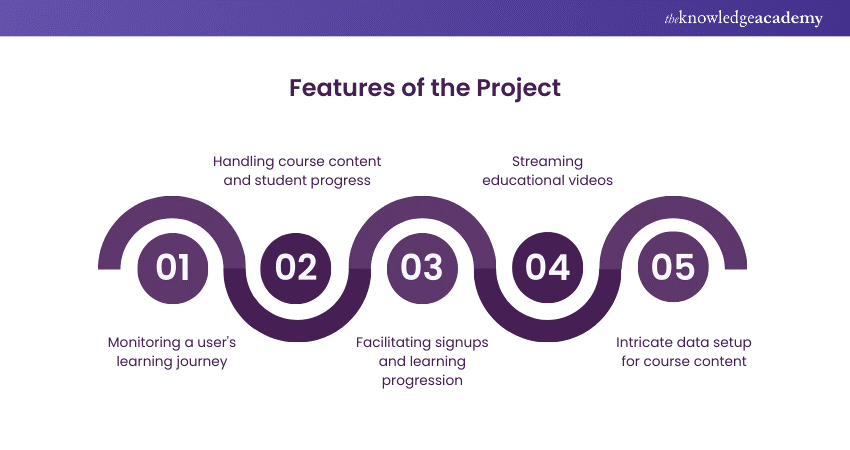
Develop a digital learning portal that allows users to sign up for courses, monitor their learning journey, and communicate with educators. MongoDB is employed to handle course content, student profiles, and their progress.
Moreover, Express.js is used to create APIs that facilitate course sign-ups, track learning progression, and verify user identities. Angular is tasked with crafting a user-friendly and adaptable interface for course navigation.
The key benefits include:
a) A catalogue of courses with comprehensive descriptions and sign-up facilities.
b) Streaming of educational videos and monitoring of course completion.
c) Interactive forums for dialogue between learners and teachers.
d) Direct communication channels between educators and students.
The skills showcased include:
a) Handling intricate data setups for course content and user engagements.
b) Setting up live messaging functionalities using Node.js.
5) Tracker for personal financial management
Develop a personal finance management app that assists users in overseeing their expenditures and savings objectives. MongoDB is utilised for recording financial transactions, user information, and budget targets.
Now, Express.js is responsible for establishing APIs for logging transactions, computing budgets, and ensuring user security. Angular is used to create graphical representations of spending habits and expense classification.
The key benefits include:
a) Automated recording and categorisation of financial transactions.
b) Setting and monitoring budgetary goals.
c) Detailed expense analysis by category and over various time frames.
d) Graphical representations showcasing financial patterns and insights.
The skills exhibited include:
a) Application of data analysis and visual representation techniques using Angular.
b) Task automation facilitated by Node.js.
Create effective information architecture by signing up for our UI UX Design Course now!
6) Chat application/website
Chatting and messaging apps have become integral to our daily communication, serving as a medium for everything from sharing important documents to light-hearted jokes. Building your own chat application is not only a popular full-stack project but also a great learning opportunity.
The key takeaways from this project:
a) This project offers extensive learning experiences. A key aspect is creating a user-friendly front-end; it's crucial for the chat app's interface to be visually appealing and prioritise user experience, ensuring users can easily message friends or groups.
b) The process should be straightforward and intuitive. Additionally, implementing login and authentication protocols is essential for user access. Efficient database management is another vital component, as it ensures quick retrieval of both new and old chat messages.
c) A critical feature of chat apps is real-time communication among users, often achieved using technologies like Socket.io. This project encompasses a broad range of skills, from front-end design to backend functionalities and real-time data handling.
For inspiration, you can refer to a GitHub repository of a sample chat application, which includes source code. Use this as a starting point to create your unique and engaging chat platform, and invite friends to communicate on your personalised app.
7) Personal portfolio website
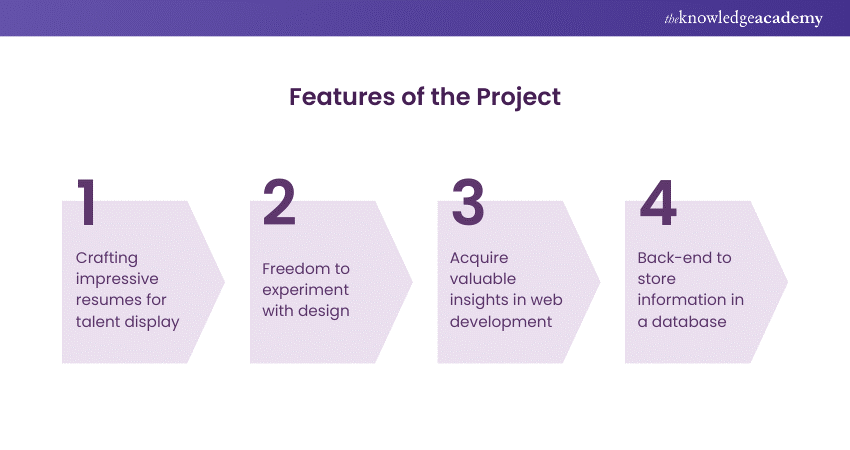
Portfolio websites have become a prevalent and essential tool. Developers craft impressive portfolio sites to display their talents and captivate potential clients. For both students and professionals foraying into web development, creating a personal portfolio website is highly recommended as an excellent practice exercise, particularly for honing front-end development skills.
More importantly, such projects offer a unique platform where creativity knows no bounds. You have the freedom to experiment with design, layout, and content, making your website a true reflection of your personal style and professional abilities.
This flexibility allows you to explore innovative design elements, interactive features, and cutting-edge technologies to make your portfolio stand out. Additionally, a well-designed portfolio website serves as a dynamic resume, showcasing your projects, skills, and experiences to a global audience, thereby enhancing your visibility and employability in the tech industry.
Moreover, your undertaking of this project will help you acquire substantial insights and proficiency in web development, particularly in front-end design. Additionally, most portfolio websites feature a ‘Contact-Me’ section.
Such an aspect involves creating a form for visitors to reach out to you, necessitating some back-end development knowledge to handle and store user information in a database. This comprehensive project not only serves as a testament to your development capabilities but also provides extensive practical experience.
8) Food delivery platform
Who doesn’t like food? Everyone wants to enjoy a delicious meal after the end of a hard-working day. So, there are various websites and apps in India, like Uber Eats, Swiggy, and Zomato, that have become popular and grown their businesses around this idea.
So, a food application or website is another interesting full-stack project that is very popular as well as a not-so-old idea. The knowledge that you will gain from this project:
You can learn a lot about developing a large-scale full-stack website or app by making this project. It involves a lot of backend knowledge and practice in making a major project like this. For instance, you require a backend for registering a restaurant under your services or ordering the food or changing the delivery address, and so on.
Knowledge of the front end is also a must and is going to help you a lot in making an interactive website/app. Managing a large-scale database is something that you can get familiar with by making this project.
Generate an impactful online presence by signing up for our Website Design Course now!
9) Online therapy platform
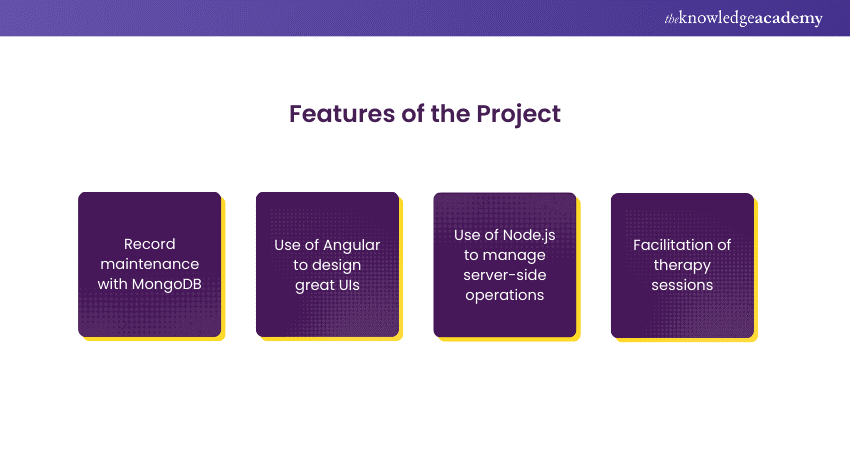
Building an online therapy platform is a significant and beneficial project that can be effectively developed using the MEAN stack. Utilise MongoDB to maintain records of therapist profiles, client details, and chat transcripts.
Employ Express for crafting RESTful APIs to oversee therapy sessions and handle financial transactions. Angular is instrumental in designing an accessible and engaging user interface, while Node.js manages the server-side operations. Additionally, incorporate socket.io for facilitating instantaneous communication.
The key benefits include the following:
a) A comprehensive directory of therapists with user ratings.
b) Facility to reserve and organise therapy sessions.
c) Capabilities for both text messaging and video calls.
d) Creation and maintenance of user profiles, along with a mechanism for providing feedback.
e) Smooth integration of payment processing systems.
10) Logo maker platform
Developing a logo maker platform is an imaginative and enjoyable venture that can be realised with the MEAN stack. Employ MongoDB for storing a variety of logo templates, user data, and logos created by users.
Use Express for building RESTful APIs that facilitate the creation and preservation of logos. Angular is key for crafting an engaging and responsive front-end interface, while Node.js manages the backend operations and handles image manipulation tasks.
The key benefits include:
a) A diverse range of logo templates available for personalisation.
b) Comprehensive logo editing features including text, colour, shapes, and sizing adjustments.
c) The ability to preview and download the finalised logo.
d) A system for user registration and secure login.
e) A personal gallery for users to store and share their created logos.
Conclusion
In conclusion, MEAN Stack Projects offer an excellent blend of technology and creativity, providing developers with the tools to build dynamic, efficient applications. These projects not only enhance technical skills but also foster innovation, making the MEAN Stack an ideal choice for aspiring and seasoned developers alike.
Frequently Asked Questions

The MEAN stack is a framework centered on JavaScript, designed for crafting web applications. Its name derives from the four core technologies it utilises: MongoDB, Express, Angular, and Node, each representing a different layer of the stack. Alternative variations of the MEAN stack include MERN (substituting Angular.js with React.js) and MEVN (employing Vue.js instead). Renowned for its efficiency and versatility, the MEAN stack remains a top choice for web application development.

MEAN stack-based applications adhere to the client-server model. The client side, developed using Angular, can manifest as a web app, a native mobile app, or a desktop application. This client interacts with the server via an API, constructed using Express, facilitating seamless communication between the two components.

With all the essential tools ready, you can build your MEAN stack application in the given ways:
Step 1: Initiate your project setup.
Step 2: Focus on developing the backend using Express.
Step 3: Craft the frontend utilising Angular.
Step 4: Linking Angular with Express.
Step 5: Configure MongoDB.
Step 6: Deploy your MEAN Stack Application.

The MEAN stack is a free, open-source JavaScript software stack designed for creating cutting-edge web and mobile applications. Since every element of the MEAN stack is conducive to JavaScript programming, it allows for applications to be uniformly developed in JavaScript across both server-side and client-side environments.

The Knowledge Academy takes global learning to new heights, offering over 30,000 online courses across 490+ locations in 220 countries. This expansive reach ensures accessibility and convenience for learners worldwide.
Alongside our diverse Online Course Catalogue, encompassing 17 major categories, we go the extra mile by providing a plethora of free educational Online Resources like News updates, Blogs, videos, webinars, and interview questions. Tailoring learning experiences further, professionals can maximise value with customisable Course Bundles of TKA.

The Knowledge Academy’s Knowledge Pass, a prepaid voucher, adds another layer of flexibility, allowing course bookings over a 12-month period. Join us on a journey where education knows no bounds.

The Knowledge Academy offers various App & Web Development Courses, including Introduction to HTML, UI UX Design Course, CCS Course and Mobile App Development Course. These courses cater to different skill levels, providing comprehensive insights into Front End Web Development.
Our Programming & DevOps blogs covers a range of topics related to Web Development, offering valuable resources, best practices, and industry insights. Whether you are a beginner or looking to advance your Programming & DevOps skills, The Knowledge Academy's diverse courses and informative blogs have you covered.
Upcoming Programming & DevOps Resources Batches & Dates
Date
 MEAN Stack Web Development Training
MEAN Stack Web Development Training
Fri 28th Mar 2025
Fri 23rd May 2025
Fri 4th Jul 2025
Fri 24th Oct 2025
Fri 5th Dec 2025







 Top Rated Course
Top Rated Course



 If you wish to make any changes to your course, please
If you wish to make any changes to your course, please


